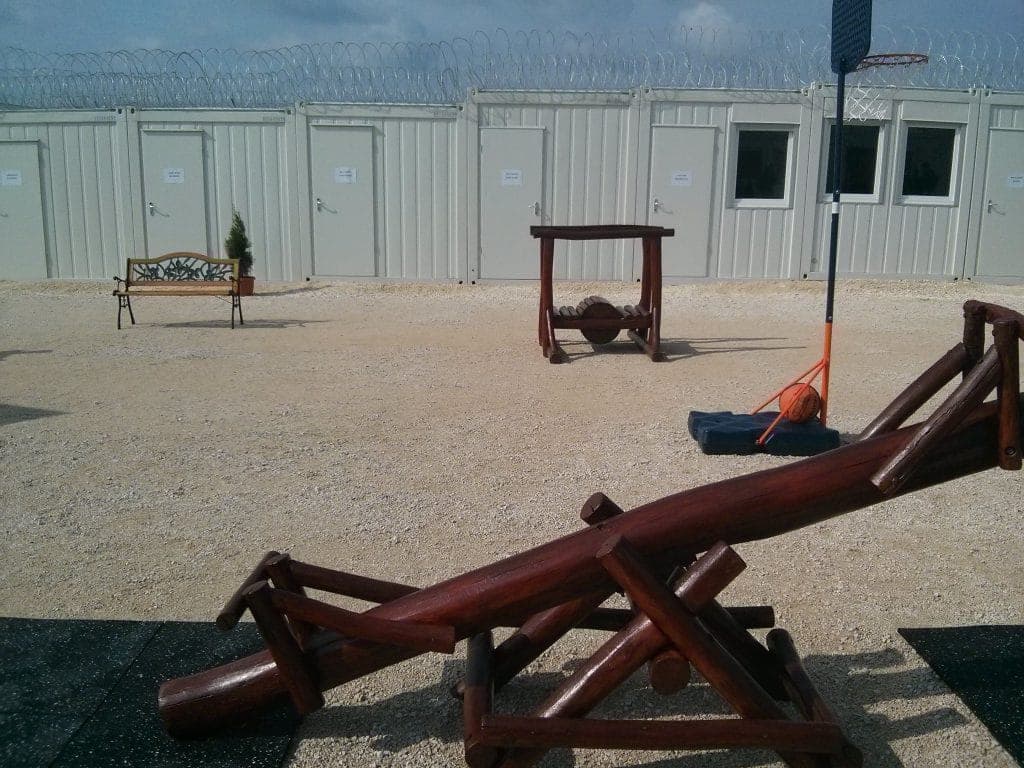European Court of Human Rights judgments condemn detention of asylum-seekers in Hungarian transit zones
Translation is available for this content
Váltás magyarraThe transit zones have been shut down for three and a half years, but this cruel detention regime did not disappear without a trace, still haunting the European Court of Human Rights in Strasbourg. On 5 October, three judgments were delivered at Strasbourg where the applicants were asylum-seekers, all successfully represented by the Hungarian Helsinki Committee.

“Playground” in the courtyard of the Tompa transit zone
The transit zones were shut down by the government after the Court of Justice of the European Union ruled in May 2020 that detention in transit zones was unlawful. Hundreds of asylum-seekers, including families and children detained for up to a year were released as a result of that ruling.
Prior to that, for five years, seeking asylum in Hungary was practically only possible in the transit zone. It was very hard to get in, but even harder to get out. These zones were inhuman container prisons in the middle of nowhere, where from 2016 onwards, mostly families and unaccompanied children were detained. The conditions were unfit for them: barbed wires, armed guards and guard dogs kept the children and their parents terrified. There were no meaningful activities, no valuable education provided, and health care was also lacking. Inertia, hopeless waiting, and imprisonment have sickened people who in many cases arrived already ill.
The summer heat and the cold winter made life there even more miserable. In several cases adults, mostly parents, were not given food for days, and in order to be able to eat again, the Hungarian Helsinki Committee had to intervene at the Strasbourg Court.
The transit zones were not a gateway to Hungarian asylum protection, as the government promised. Their real role was to scare and exhaust asylum-seekers so that they would “voluntarily” leave their container prisons and go back to Serbia, thus depriving themselves of the possibility of asylum.
Asylum-seeking children were treated by the state as if they had been criminals. But the real criminal was the Hungarian state. The transit zones in Tompa and Röszke have become a disgrace to the country. Similarly to the previous transit zone cases won by the Hungarian Helsinki Committee, the judgements delivered on 5 October by the Strasbourg Court confirm the above.
O.Q., the starved Kurdish youth
The young Kurdish man, who had just turned eighteen after fleeing Syria, spent eight and a half months in the Tompa transit zone. Had it been up to the asylum authorities, his detention would have been longer, but the Hungarian Helsinki Committee managed to convince the national court to release the completely exhausted boy in the spring of 2019. During his detention, his physical and mental condition deteriorated to such an extent under the harsh circumstances that it was impossible for him to benefit from any medical and psychological assistance while detained. Being released from his container prison became fundamental for his recovery.
He is also one of those who had been starved. He was not provided with any food for six days before the Strasbourg Court ordered the authorities to give him food, following an intervention of the Hungarian Helsinki Committee.
Now the European Court of Human Rights ruled that the treatment of O.Q. by the Hungarian state violated the prohibition of torture or inhuman or degrading treatment and punishment. The young man was also unlawfully detained without any legal remedy. He was awarded a just satisfaction of 4,500 euros.
The tortured Afghan family of five
From war-torn Afghanistan in a life-threatening situation, the father, his wife and their three children, aged 10 years, 8 years and 4 months, entered the transit zone in Ruse on 20 February 2018. Obviously, they were all in very bad condition. The 100-day imprisonment was particularly hard on one parent struggling with a severe mental illness and the middle child.
Now the European Court of Human Rights ruled that the Hungarian state violated the prohibition of torture or inhuman or degrading treatment and punishment in the case of the asylum-seeker children. Moreover, all the family members were unlawfully detained without any legal remedy. The Court awarded to them a just satisfaction of 11,000 euros in total.
The Iraqi mother and her little son
S., the mother and her 4-year-old son A. M. were detained for four months in the Tompa transit zone in 2017. The woman fled Iraq to escape her abusive husband and was deeply traumatized by the long journey itself. Her child was also struggling with illness. Yet they did not receive any meaningful medical assistance or treatment in the transit zone, and they were not even taken out to hospital.
Now the European Court of Human Rights ruled that the Hungarian state violated the prohibition of torture or inhuman or degrading treatment and punishment in their case. They were also unlawfully detained without any legal remedy. The Court awarded them a just satisfaction of 6,000 euros in total.
“In these judgments, the Strasbourg Court has for the umpteenth time ruled that the prolonged, inhumane detention of asylum-seekers in transit zones violated fundamental human rights. It is always very touching to see how important it is in each of our clients’ lives to acknowledge their suffering, their humiliation, to speak about the injustices they have experienced. This is the kind of justice they didn’t receive from our country, but the European Court of Human Rights has now provided it to them” – said attorney Barbara Pohárnok, who represented the asylum-seeker clients of the Hungarian Helsinki Committee in all three cases.